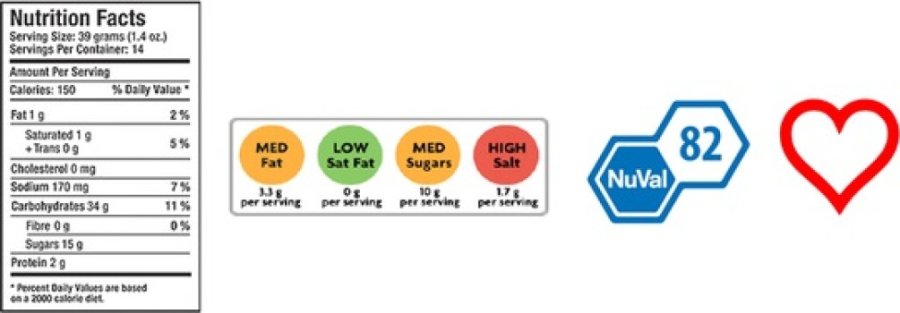If you’re like most shoppers, then chances are, a trip to the grocery is usually unplanned, quick, and sometimes, not very fruitful when it comes to making healthy choices. Much of the blame can be attributed to current nutrition labeling which is ineffective, according to a study by McGill University.
The study, published in the Annals of the New York Academy of Sciences, found that other labeling systems are more efficient.
Researchers compared four different systems, finding that the one most frequently used in the US and Canada is the least useful for buyers. This system lists percentages of the daily value of specific nutrients. Although the labels do provide exhaustive information, they can be confusing and can be difficult to compare in terms of nutritional value to similar products.
Another system called NuVal, which indicates the overall nutritional value of products with a single score between 1-100, is used in some products in the US and Canada. Researchers found this system to be much easier to follow, since it does away with the need to ascertain the health values of foods by comparing so many different contents (including fat, sugar, salt, etc.). For instance, one product may be low in fat, yet high in sugar; another similar product may contain more fat but less salt and sugar. Therefore, working with one overall number is more practical for the average shopper.
NuVal takes a wide array of nutritional factors into account to come up with a single score; these factors include vitamins, natural minerals, antioxidants, trans fats, saturated fats, Omega-3 fats, cholesterol, sugar and salt. NuVal also takes into account the quality of different foods and their caloric content, as well as their carbohydrate content and glycemic index. Foods made with high fructose corn syrup, for instance, which tend to be high up on the glycemic index, naturally have a lower NuVal score than foods sweetened with healthier alternatives like Stevia.
Antioxidant content is also considered important – thus, scientists look into total bioflavanoid and carotenoid leves, as well as Vitamins A, C and E. Scores for different products can change over time, for instance if the product is made with different ingredients, or if new findings are made that enable scientists to update the algorithms they use to determine scores. NuVal was developed by a team of scientists, including the renowned Dr. David Katz of Yale. The aim is to stop the obesity epidemic, which is strongly linked to disease and death.
NuVal scores are calculated by scientists at several of the nation’s top universities, including Harvard and Yale. The values aim to resolve apparent conflicts by providing one single score that can enable good choices to be made in a minimum amount of time. The NuVal system was endorsed by The American College of Preventive Medicine (ACPM): a professional society of doctors committed to disease prevention and the promotion of better health. The ACPM has stated that not only is NuVal quick and easy to use, it also has great value because of its independence from food manufacturers.
Two other labeling systems were considered in the study. One, called the Traffic Light system, is used in the UK. It uses several traffic lights, which can take time to compare with the values in other products. Another system, used in Denmark, Sweden and Canada, labels some foods as nutritious, but not others. Researchers noted that this system does not discriminate adequately between foods. They can also create issues about where to draw the line between healthy and unhealthy foods. They noted that clearer labeling systems, such as Industrial Labeling, should be adopted in an aim to encourage food manufacturers to improve their products and to make health a more important consideration.
Systems like NuVal can help battle the rising rates of Type II diabetes and obesity – diseases which are taking a heavy financial toll on the nation and on those who suffer them. The ones suffering from it are looking for a diabetes cure. One interesting study by scientists at Harvard found that those who filled their shopping carts with foods scoring high on the NuVal list, were less likely to have illnesses such as diabetes and heart disease. Another recent study published in the journal Archives of Internal Medicine, found that three lifestyle choices were heavily linked to chronic diseases: smoking, lack of exercise, and poor nutritional choices.
Credit: Image courtesy of McGill University




